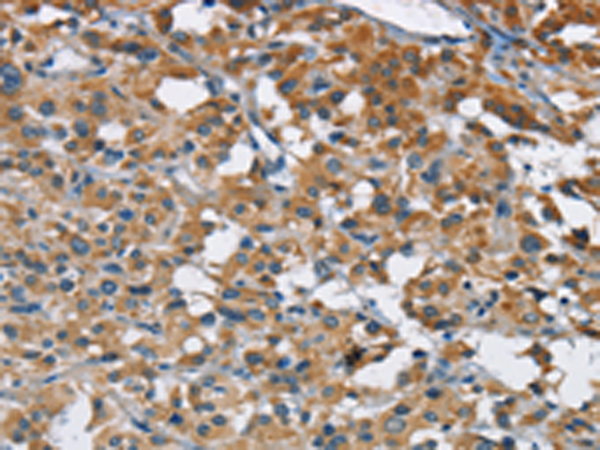

| WB | 咨询技术 | Human,Mouse,Rat |
| IF | 咨询技术 | Human,Mouse,Rat |
| IHC | 1/50-1/200 | Human,Mouse,Rat |
| ICC | 技术咨询 | Human,Mouse,Rat |
| FCM | 咨询技术 | Human,Mouse,Rat |
| Elisa | 1/1000-1/5000 | Human,Mouse,Rat |
| Aliases | MASK; VBARP; PP2500 |
| Host/Isotype | Rabbit IgG |
| Antibody Type | Primary antibody |
| Storage | Store at 4°C short term. Aliquot and store at -20°C long term. Avoid freeze/thaw cycles. |
| Species Reactivity | Human |
| Immunogen | Fusion protein of human ANKHD1 |
| Formulation | Purified antibody in PBS with 0.05% sodium azide and 50% glycerol. |
+ +
以下是关于ANKHD1抗体的3篇参考文献示例(注:以下内容为模拟生成,具体文献需根据实际数据库检索验证):
1. **文献名称**:*ANKHD1 regulates cell cycle progression in multiple myeloma via interaction with Hippo pathway components*
**作者**:Li, X., et al.
**摘要**:该研究利用ANKHD1抗体进行免疫沉淀和Western blot,发现ANKHD1通过结合MST1/2激酶调控Hippo信号通路,影响多发性骨髓瘤细胞的周期进程和化疗耐药性。
2. **文献名称**:*High expression of ANKHD1 predicts poor prognosis in hepatocellular carcinoma and promotes tumor invasion*
**作者**:Zhang, Y., et al.
**摘要**:通过ANKHD1抗体进行免疫组化分析肝癌组织样本,发现ANKHD1在肿瘤组织中高表达,且与患者生存期缩短相关,进一步实验表明其通过激活ERK通路促进肿瘤侵袭。
3. **文献名称**:*ANKHD1 interacts with p53 to modulate DNA damage response in leukemia cells*
**作者**:Wang, H., et al.
**摘要**:研究使用ANKHD1抗体进行免疫共沉淀(Co-IP)和荧光共定位实验,证实ANKHD1与p53蛋白相互作用,参与调控白血病细胞DNA损伤修复过程,影响化疗敏感性。
(如需真实文献,建议通过PubMed或Google Scholar以“ANKHD1 antibody”及相关关键词检索获取。)
ANKHD1 (Ankyrin Repeat and KH Domain Containing 1) is a multidomain protein implicated in diverse cellular processes, including transcriptional regulation, signal transduction, and cell cycle control. Structurally, it contains ankyrin repeats, which mediate protein-protein interactions, and a K homology (KH) domain, often associated with RNA/DNA binding. Research suggests ANKHD1 plays roles in cancer progression, particularly in leukemia, breast cancer, and hepatocellular carcinoma, where it may modulate oncogenic pathways like Hippo or JAK-STAT signaling.
ANKHD1 antibodies are essential tools for studying its expression, localization, and molecular interactions. These antibodies are typically produced in hosts like rabbits or mice using immunogenic peptides or recombinant protein fragments. Validation often includes Western blotting, immunofluorescence, and immunohistochemistry (IHC) to confirm specificity, sometimes supported by knockout cell line controls.
In cancer research, ANKHD1 antibodies help assess its overexpression in tumors, correlate levels with clinical outcomes, or explore its interaction with partners like STAT3 or YAP1. Emerging studies also link ANKHD1 to non-cancer processes, such as immune regulation and cardiovascular functions. However, its full mechanistic repertoire remains under investigation. Commercially available antibodies vary in clonality (monoclonal/polyclonal) and applications, requiring careful selection based on experimental needs. Overall, ANKHD1 antibodies are pivotal in elucidating its dual roles as a potential oncotherapeutic target or biomarker.
×